In the last installment we saw warehouses and merchant ships, medieval warfare and intergalactic combat, as well as the rise of an ancient civilization. This week we’ll see a game where we build across the country we live in, visit a country you’ve probably never heard of, conquer a continent that doesn’t exist, and more!
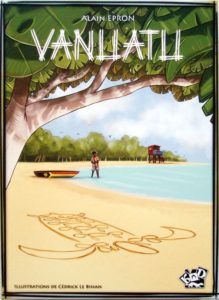 |
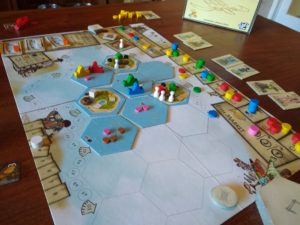 |
20) Vanuatu (2011): There aren’t many opportunities in Vanuatu, a tiny country split between 80 islands in the middle of the Pacific Ocean. So it is in this game. There are a handful of ways to get points, but everyone wants them and there are never enough. You can theoretically take five actions each turn, but just because a player picks an action doesn’t mean they’ll get to do it. The player who invests the most into an action gets to do it first and that’s important, because each time an action is taken the chances of being able to gain from it shrink. This means players are rewarded for doing things that other players aren’t interested in, but being able to profit from unpopular decisions is difficult, as choices are limited. The opportunistic nature of scoring means that this game doesn’t have grand strategies, instead requiring players to take things one turn at a time, but also to prime themselves for what might become available next round. A player’s entire turn can be wasted if they misread the situation they are in, scuttling their chances of victory. Some turns you might just resign yourself to take one valuable action, knowing that spreading yourself thin will be a disaster. Vanuatu isn’t a game about great riches. It doesn’t have swingy plays. No one rules the world at the end. Players just do the best they can and sometimes that’s enough.
 |
 |
19) Tokyo Highway (2016): Dexterity games have a reputation for being “kid games” that people grow out of. They reward players with steady hands instead of keen minds, but a really well-made game can please both body and mind. Tokyo Highway has players attempt to build a road that passes over and under those made by other players. Dexterity is certainly required, but creativity and planning are also rewarded as players attempt to make building difficult for their opponents by bending their highways at all sorts of odd angles. Few games use three dimensional space better than this one, and even fewer look so eye catching when it’s over. If you like building, balancing, and spatial planning, Tokyo Highway is definitely going to please you.
 |
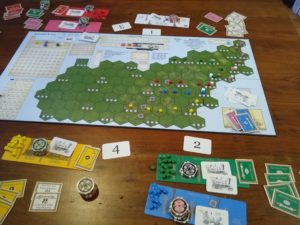 |
18) Baltimore and Ohio (2009): This is definitely an economic game, but if you look very closely, you’ll notice it’s actually dozens of tiny race games bound together to make an economic game. Sure, you have to manage your money, invest wisely, balance short-term gains against long-term value, and all of the other things common to games of dollars and shares. The rub is that getting ahead relies entirely on the many different races going on simultaneously in this game. There’s a race to get the best trains, a race to get into the best cities, a race to launch the best company, a race to buy the best shares, a race to get the coal, and more. Vying for each of these little edges is vital, but all of these little victories can become undone with a single mistake, forcing players to be both aggressive and vigilant. While somewhat more forgiving and less complicated than certain other games of this type (you’ll be seeing one of these later!), Baltimore and Ohio’s ceaseless competition over every last dollar makes one of the best of its genre.
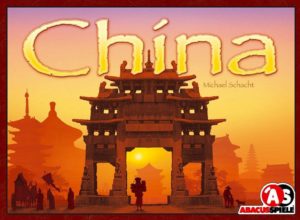 |
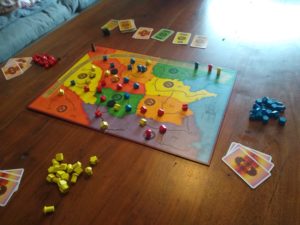 |
17) China (2005), [Web of Power (2000)]: El Grande is the forefather of area control games. It is a dynamic and exciting game filled with swingy plays and vicious interaction. It’s a great game and possibly should be on this list, but for my money China (and Web of Power, its almost identical twin) are the better game. China distills area control down to its bare bones essence, gives it an elegant scoring mechanic, and cuts the play time down to something you can finish at lunch. One of the few games that is at its best with 3 players, China challenges players to both leach off of their opponents’ moves while countering their ability to make big scoring plays. Every move you make can help the other players, so care is required to avoid being used to catapult another player to victory. While El Grande is a grand game that is fantastic with 5, China’s condescended 3 player experience is so rare and delightful that it has a truly irreplaceable spot in my collection.
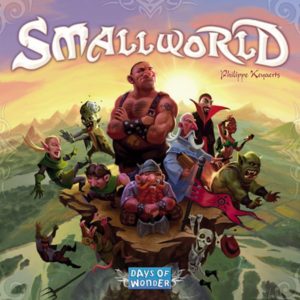 |
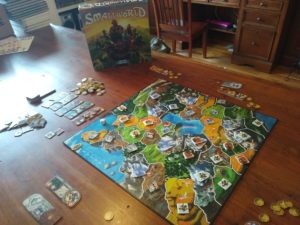 |
16) Small World (2009): Small World definitely looks like a silly game. With cutesy graphics, a fantasy theme, and tons of variability, you would be excused if you couldn’t tell from looking at it that it is probably the best pure territory control game ever made. While there is some luck of the die and swingy powers can pop up at the wrong time, strategic decisions generally rule the day as players manage multiple armies over the course of the game to take territory, seeking to leverage the advantages of the hundreds of different combinations of special abilities their forces can have. Small World does a great job making serious strategic gameplay look like a wacky romp in a way that can bring all types of players together.
Check back with us for another installment soon!
